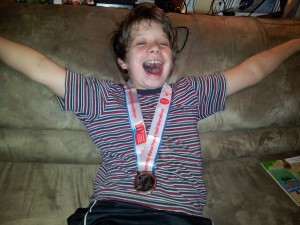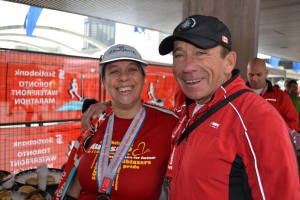Yesterday, I spoke about the aspects of the ALS Ice Bucket Challenge that bother me. At the same time, I acknowledged that this campaign has been wildly successful in raising funds and awareness for ALS. Although I have been nominated, I have declined to participate – not only because of the reasons stated yesterday, but because there is another cause that is nearer and dearer to my heart. I am not in any way diminishing the ALS cause, I am just saying that with my limited funds and more limited energy, I have to focus my efforts on a cause that directly impacts my family.
Every year, I participate in the Charity Challenge of the Scotiabank Toronto Waterfront half-marathon to raise funds for autism services, and this year is no different. The money I raise goes to the Geneva Centre for Autism, a wonderful organization that has provided endless support not only to my autism boy, but also to his younger brother, my husband and myself. I can say without reservation that my son’s life – all of our lives – would be very different if it weren’t for the Geneva Centre.
The thing is, though, that fundraising is hard, and it gets more difficult every year. People struggle. They have difficulty paying their bills on time and providing for their families. Life in this day and age is not easy. And the people who do have funds to donate are increasingly selective about where that money goes, and rightfully so. There have been so many stories about donated funds lining the pockets of people who are already rich.
I can give my personal assurance that money donated to the Geneva Centre for Autism does not go towards ridiculously high salaries or swanky events. It is used for things like art supplies and musical instruments for kids with autism, job skills training for those leaving school, iPads for those in need of communication assistance, and summer camps for children and youth who need help with social skills development. This is money that is used to help real children and their families. It is money that genuinely makes a difference and can change the course of a young person’s life for the better.
This year, for those who do have a few dollars to donate, I am adding an element of fun to my fundraising efforts. It is a variation of the ALS campaign, and I am calling it “Ice Buckets For Autism”. The premise is simple: for every $100 that I can raise for autism, I will dump a bucket of ice water on my head. In keeping with my concerns about using water wisely, I will dump it in such a way that it can later be used for something else.
There are no nominations and there is no stipulation as to how much each person should donate. People can simply donate if and how much they choose, and every time the hundreds digit of my fundraising total changes, I will drench myself and provide photographic and video evidence of the act.
I am hoping to be drenched many, many times.
This is an original post by Kirsten Doyle. Photo credit to the author.











